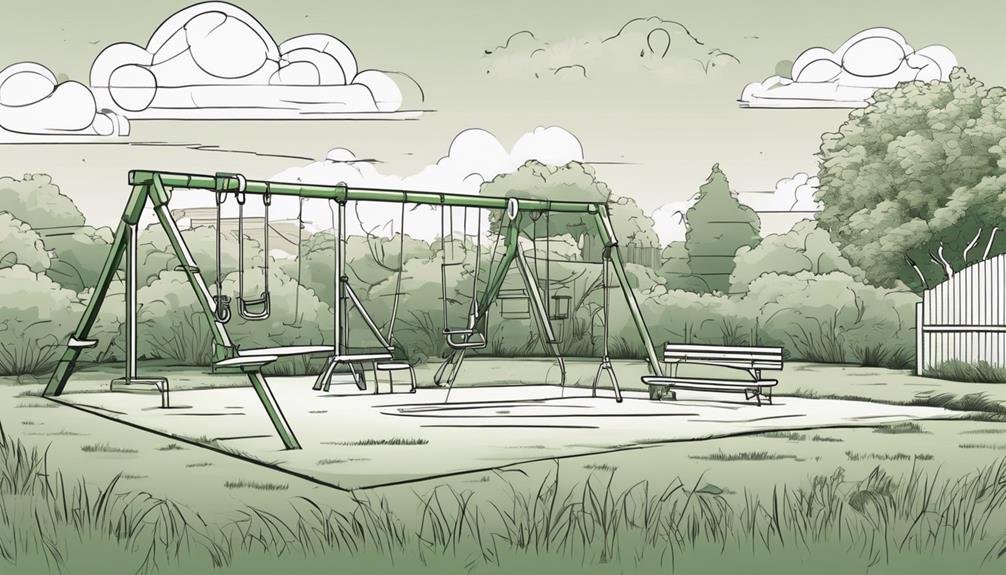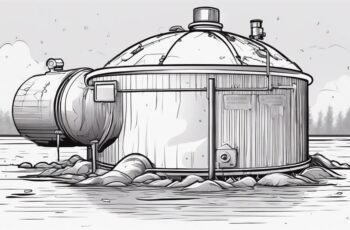If you've noticed a lingering stench near your yard even after cleaning up pet waste, it might be time to consider the health of your septic system. Foul odors around the property could be a sign of a full septic tank, but that's just the beginning.
The subtle signs of a septic system reaching capacity can often go unnoticed until more significant issues arise. Stay tuned to uncover the less obvious indicators that could save you from a messy situation.
Key Takeaways
- Foul odors and slow drains signal septic issues.
- Lush grass over drain field indicates system problems.
- Gurgling sounds from fixtures may signify septic issues.
- Early detection and regular maintenance prevent costly repairs.
Foul Odors Around the Property

Have you noticed persistent foul odors lingering around your property recently? If so, it might be a sign of issues with your septic system. To address this, consider implementing odor control measures. Start by checking for any visible signs of sewage leaks or septic tank overflow. It's crucial to conduct soil testing to determine if there are any leaks contaminating the soil around your property.
Odor control methods can help mitigate the unpleasant smells emanating from your septic system. Ensure that your septic tank is properly sealed and that all connections are secure to prevent any leaks. Regular maintenance, such as pumping your septic tank every few years, can also aid in controlling odors. Additionally, planting grass or vegetation over the drain field can assist in absorbing excess moisture and odors.
Slow Draining Fixtures in the House
If you're experiencing sluggish drains in your home, it may indicate a potential issue with your septic system. Slow draining fixtures are a common sign of a full septic system that shouldn't be ignored. Here are some steps you can take to address this problem:
- Check Multiple Drains: Verify if multiple drains in your house are draining slowly. This can help determine if the issue is isolated to one fixture or a more extensive problem.
- Avoid Harsh Chemicals: Refrain from using harsh chemical drain cleaners as they can potentially harm your septic system. Opt for natural or enzymatic alternatives instead.
- Schedule Professional Inspection: Contact a professional septic tank service provider to conduct a thorough inspection of your system. They can identify the root cause of the slow drains and recommend appropriate solutions.
- Regular Septic Tank Maintenance: Ensure regular maintenance of your septic tank, including pumping as recommended by professionals. Proper maintenance can prevent issues like slow draining fixtures and extend the longevity of your septic system.
Lush, Green Grass Over Drain Field

Observing lush, green grass thriving over your drain field often indicates a potential issue with your septic system's functionality. While vibrant grass can be appealing, it may signal underlying problems. Soil compaction, a common issue in overloaded drain fields, restricts water absorption and leads to surface pooling. This can create an environment where grass appears healthier due to excess moisture, but it actually indicates inadequate drainage below.
Moreover, nutrient leaching, a consequence of a full septic tank or clogged drain field, enriches the soil above, promoting lush growth. However, this excess of nutrients is harmful in the long run, as it signifies that the system isn't effectively processing waste. To address this concern, it's crucial to have your septic system inspected promptly.
To prevent further damage and ensure proper functioning, reduce water usage, avoid parking or heavy objects over the drain field, and seek professional assistance to resolve any underlying septic system issues. Remember, maintaining a healthy drain field is essential for the longevity of your septic system.
Gurgling Sounds From Plumbing Fixtures
When plumbing fixtures emit gurgling sounds, it may indicate potential issues within your septic system's functionality. These noises can be an early warning sign of a full septic system or other problems that require attention. Here are some key points to consider:
- Gurgling Noises: Gurgling sounds in your plumbing fixtures, such as toilets, sinks, or showers, suggest that there may be a blockage or buildup in your septic system causing air bubbles to escape.
- Causes: The gurgling noises could be due to excess waste or sludge accumulating in the pipes, a full septic tank that needs pumping, or even a clogged drain field preventing proper drainage.
- Plumbing Fixtures: Regularly maintain your plumbing fixtures by avoiding flushing non-biodegradable items, using septic-safe toilet paper, and being mindful of what goes down the drains to prevent potential issues.
- Maintenance: Schedule routine septic system inspections and pumpings every few years to ensure proper functioning and prevent costly repairs.
Being proactive and addressing gurgling sounds promptly can help maintain the health and longevity of your septic system.
Conclusion
In conclusion, if you notice foul odors, slow drains, lush grass, or gurgling sounds, your septic system may be full. Ignoring these signs can lead to costly repairs and environmental damage.
Did you know that a leaking septic system can contaminate groundwater and harm wildlife?
Don't wait until it's too late – schedule a septic tank inspection today to ensure your system is functioning properly and protect your property and the environment.

